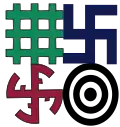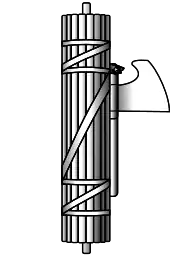| Part of a series on |
| Fascism in Romania |
|---|
 |
|
Organizations
|
|
Periodicals
|
|
Events
|
Neo-Legionarism (Romanian: Neolegionarism) is a neo-fascist movement in Romania that emerged in the 1990s following the fall of communism in the country. It is endorsed by a series of organizations that claim to be the successors of the Iron Guard (whose followers were known as "Legionnaires") founded by Corneliu Zelea Codreanu in 1927. Its main characteristics include antisemitism, Eastern Orthodoxy, ethnic nationalism and mysticism.[1]
Links between neo-Legionary organizations and priests of the Romanian Orthodox Church are a documented phenomenon in Romania. Neo-Legionarism has kept the "prison saints" movement active.[2] In 2014, a monk at Petru Vodă Monastery in Neamț County delivered a pro-Iron Guard sermon, prompting the church hierarchy to condemn him. Earlier, a group of nuns had sung the Legionnaire tune Sfânta tinerețe legionară ("Holy Legionnaire Youth") for the birthday of prominent monk Iustin Pârvu.[3]
Noua Dreaptă ("New Right") and the Everything For the Country Party have been described as neo-Legionary.[2] The latter was founded in 1993 and drew support from members of the original Iron Guard.[4] The Alliance for the Union of Romanians has also been associated with this current, although its leaders have denied any such connection.[2]
See also
References
- ↑ Endresen, Cecilie (2010). ""The Legionaries rise!" The neo-Legionary movement in post-communist Romania". Südost-Forschungen (69–70): 284–317.
- 1 2 3 Marincea, Adina (1 February 2022). "De cine este sprijinit AUR: ruta de la preoții din Biserica Ortodoxă către neolegionarism. Camaraderia dintre Simion și Noua Dreaptă". Libertatea (in Romanian).
- ↑ Totok and Macovei, pp. 468-69
- ↑ Totok and Macovei, p. 21
Bibliography
- William Totok and Elena-Irina Macovei, Între mit și bagatelizare. Despre reconsiderarea critică a trecutului, Ion Gavrilă Ogoranu și rezistența armată anticomunistă din România. Bucharest: Editura Elefant Online, 2016, ISBN 978-973-466-206-7
| Ideology |  | ||||
|---|---|---|---|---|---|
| Events |
| ||||
| Figures | |||||
| Political parties |
| ||||
| Organizations | |||||
| Popular culture |
| ||||
| Nationalists | |||||
| Policies | |||||
| Related topics | |||||
